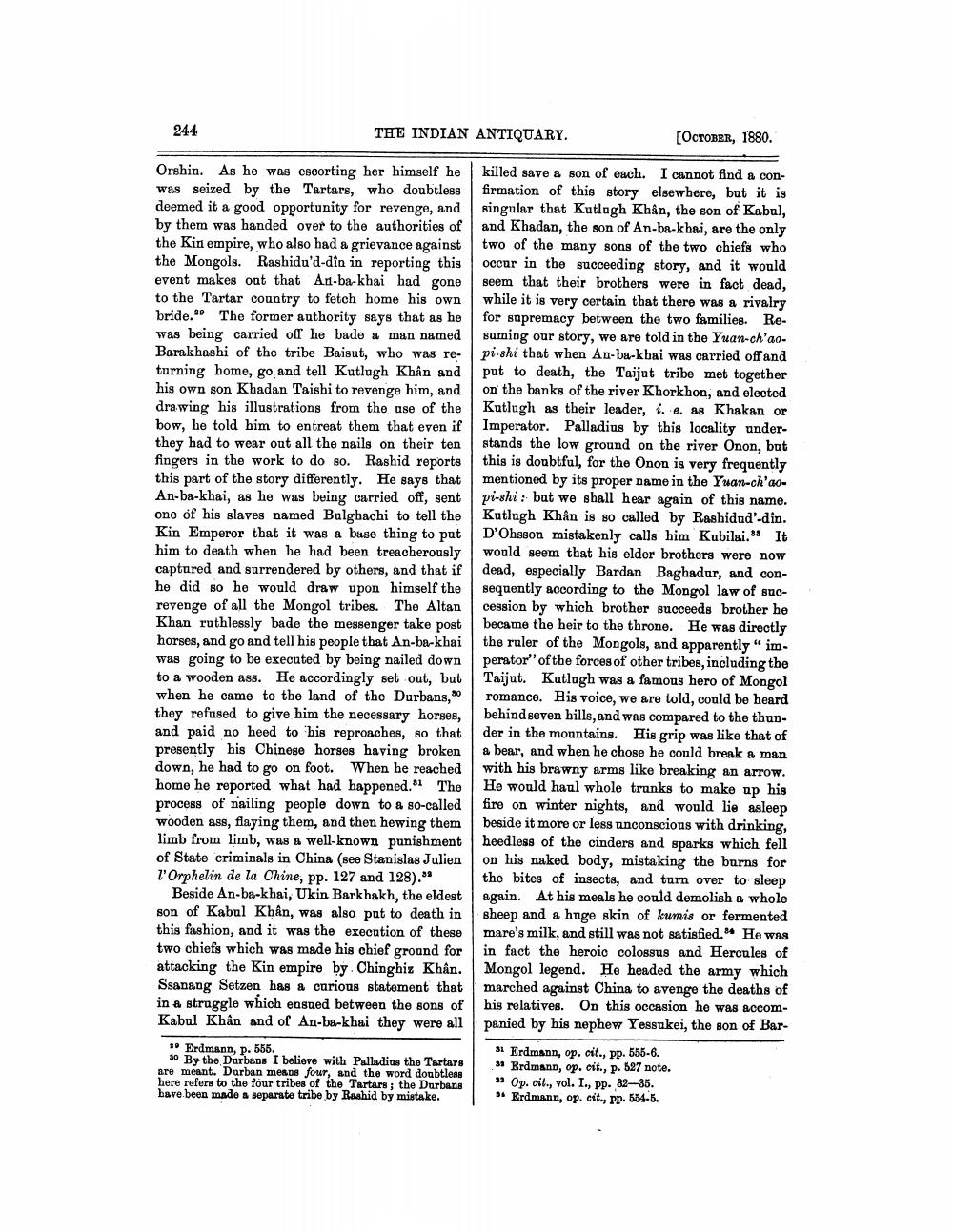________________
24.4
THE INDIAN ANTIQUARY.
Orshin. As he was escorting her himself he was seized by the Tartars, who doubtless deemed it a good opportunity for revenge, and by them was handed over to the authorities of the Kin empire, who also had a grievance against the Mongols. Rashidu'd-dîn in reporting this event makes out that An-ba-khai had gone to the Tartar country to fetch home his own. bride. The former authority says that as he was being carried off he bade a man named Barakhashi of the tribe Baisut, who was returning home, go and tell Kutlugh Khân and his own son Khadan Taishi to revenge him, and drawing his illustrations from the use of the bow, he told him to entreat them that even if they had to wear out all the nails on their ten fingers in the work to do so. Rashid reports this part of the story differently. He says that An-ba-khai, as he was being carried off, sent one of his slaves named Bulghachi to tell the Kin Emperor that it was a base thing to put him to death when he had been treacherously captured and surrendered by others, and that if he did so he would draw upon himself the revenge of all the Mongol tribes. The Altan Khan ruthlessly bade the messenger take post horses, and go and tell his people that An-ba-khai was going to be executed by being nailed down to a wooden ass. He accordingly set out, but when he came to the land of the Durbans, 30 they refused to give him the necessary horses, and paid no heed to his reproaches, so that presently his Chinese horses having broken down, he had to go on foot. When he reached home he reported what had happened. The process of nailing people down to a so-called wooden ass, flaying them, and then hewing them limb from limb, was a well-known punishment of State criminals in China (see Stanislas Julien l'Orphelin de la Chine, pp. 127 and 128)."
Beside An-ba-khai, Ukin Barkhakh, the eldest son of Kabul Khân, was also put to death in this fashion, and it was the execution of these two chiefs which was made his chief ground for attacking the Kin empire by Chinghiz Khân. Ssanang Setzen has a curious statement that in a struggle which ensued between the sons of Kabul Khân and of An-ba-khai they were all
Erdmann, p. 555.
30 By the Durbans I believe with Palladius the Tartars are meant. Durban means four, and the word doubtless here refers to the four tribes of the Tartars; the Durbans have been made a separate tribe by Rashid by mistake.
[OCTOBER, 1880.
killed save a son of each. I cannot find a confirmation of this story elsewhere, but it is singular that Kutlugh Khân, the son of Kabul, and Khadan, the son of An-ba-khai, are the only two of the many sons of the two chiefs who occur in the succeeding story, and it would seem that their brothers were in fact dead, while it is very certain that there was a rivalry for supremacy between the two families. Resuming our story, we are told in the Yuan-ch'aopi-shi that when An-ba-khai was carried off and put to death, the Taijut tribe met together on the banks of the river Khorkhon, and elected Kutlugh as their leader, i. e. as Khakan or Imperator. Palladius by this locality understands the low ground on the river Onon, but this is doubtful, for the Onon is very frequently mentioned by its proper name in the Yuan-ch'aopi-shi: but we shall hear again of this name. Kutlugh Khân is so called by Rashidud'-din. D'Ohsson mistakenly calls him Kubilai." It would seem that his elder brothers were now dead, especially Bardan Baghadur, and consequently according to the Mongol law of succession by which brother succeeds brother he became the heir to the throne. He was directly the ruler of the Mongols, and apparently "imperator" of the forces of other tribes, including the Taijut. Kutlugh was a famous hero of Mongol romance. His voice, we are told, could be heard behind seven hills, and was compared to the thunder in the mountains. His grip was like that of a bear, and when he chose he could break a man with his brawny arms like breaking an arrow. He would haul whole trunks to make up his fire on winter nights, and would lie asleep beside it more or less unconscious with drinking, heedless of the cinders and sparks which fell on his naked body, mistaking the burns for the bites of insects, and turn over to sleep again. At his meals he could demolish a whole sheep and a huge skin of kumis or fermented mare's milk, and still was not satisfied." He was in fact the heroic colossus and Hercules of Mongol legend. He headed the army which marched against China to avenge the deaths of his relatives. On this occasion he was accompanied by his nephew Yessukei, the son of Bar
31 Erdmann, op. cit., pp. 555-6.
33 Erdmann, op. cit., p. 527 note.
33 Op. cit., vol. I., pp. 32-35.
Erdmann, op. cit., pp. 554-5.




